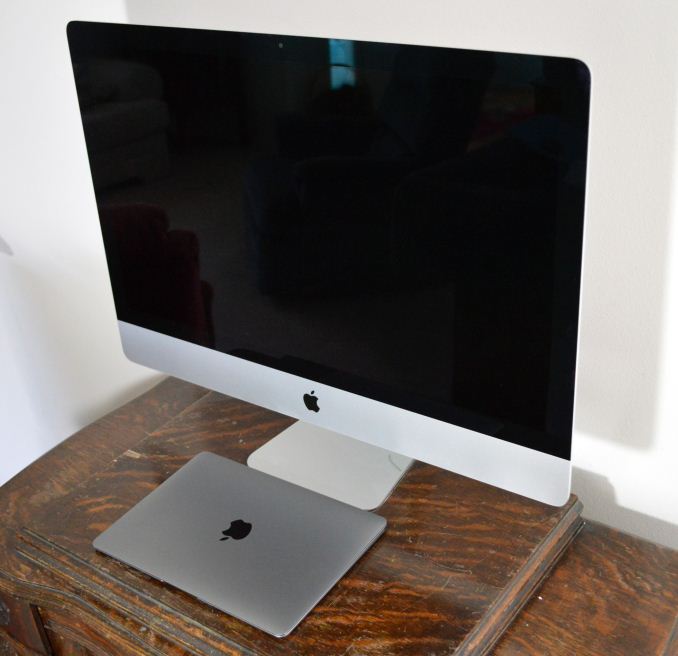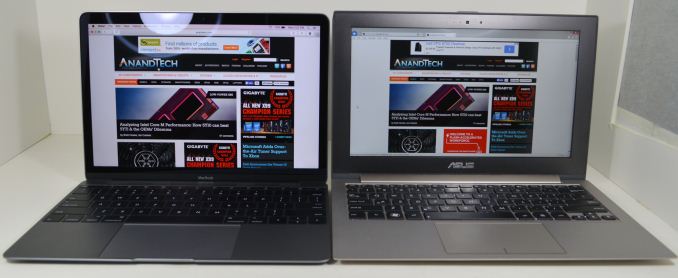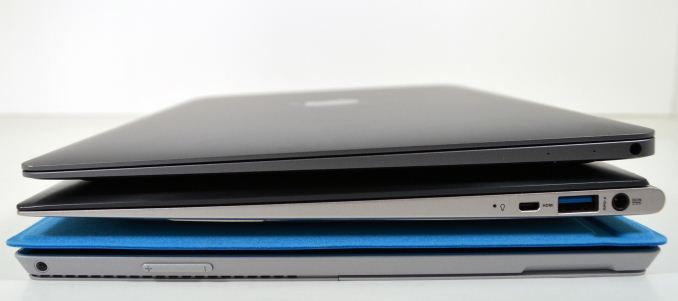The 2015 MacBook Review
by Ryan Smith on April 14, 2015 10:15 AM ESTThe MacBook’s Usability
But by far the biggest question however is what all of this lends towards the usability of the new MacBook. With Apple developing a smaller form factor and then charging a premium price for it, whether it’s worth it is a perfectly legitimate question. And the answer to that question is that it depends.
We’ll get to the all-important performance considerations in a bit, but I want to start with design first. For something built for a new form factor like a MacBook I think it’s important to look at the overall design and whether it makes sense in the first place before even getting to the tradeoffs Apple made to get here.
The 2015 MacBook reminds me of the original MacBook Air in a lot of ways, and in fact that’s probably the biggest knock against it. In 2008 the MacBook Air was revolutionary, it created what we now know as the Ultrabook category and was so cutting edge that it contained an Intel Core CPU in a form factor that no one else could get at the time. Consequently the MacBook Air wasn’t just smaller than the MacBook or MacBook Pro, but it was a lot smaller than its larger, heavier predecessors.

Big & Little: MacBook & 27" iMac
The MacBook, by contrast, is not the same jump in size. Calculated against their respective thickest points, the new MacBook is still 73% of the volume of the 11” MacBook Air. Similarly, its 0.92Kg weight is 85% of the weight of said MacBook Air. This means that whereas the original MacBook Air was a very important jump for the Apple’s laptop line, the new MacBook doesn’t get the same benefit.
With that said, there is still a distinct difference between the MacBook and MacBook Air, one that likely doesn’t mean as much in numbers as it does in feel. On a personal note my travel laptop of choice is an Asus ZenBook UX21A, an 11” Ultrabook that is a dead-ringer for the 11” MacBook Air in size and weight. So having toted around the MacBook for the past week working on this review, I was surprised by just how different it felt from my 11” ZenBook. The ZenBook is already towards the light-end of the Ultrabook spectrum, and yet after carrying around the MacBook the ZenBook feels heavy. It may only be 20% heavier in practice, but just carrying the two in hand it certainly feels like it’s more than that.

Left: MacBook. Right: Asus 11" ZenBook Prime (UX21A)
For work purposes I have always favored the 11” Ultrabook for its size and weight. It’s easy to carry around and small enough to hold with one hand or to balance on one knee as situations dictate. And while it’s not perfect – 11” isn’t much screen real-estate and doesn’t allow for much of a keyboard – as an ultra-portable secondary computer for someone who already has a desktop, it fits my needs very well.
Which is why I was surprised by just how much I ended up liking the MacBook’s size and form factor. It’s smaller than an 11” Ultrabook and yet if anything it feels bigger when in use – perhaps due to the 16:10 screen – and the weight difference can really be felt. Before using the MacBook if you had asked me whether I would want an even smaller laptop I would have dismissed the notion, but after using the MacBook I have to stop and reconsider that position.
Ultimately I’m reminded a great deal of the launch of the original MacBook Air, where Apple specifically touted it as a travel computer for someone with more than one computer. For most people it’s smaller than what you’d want to use day-in and day-out, but as a travel laptop it’s great. Consequently the MacBook as it stands is an interesting alternative to the MacBook Air lineup; it fills a lot of the same roles, but it does so while being even thinner and lighter.

Top: MacBook. Middle: Asus 11" ZenBook Prime. Bottom: Surface Pro 3 w/Type Cover
That said, compared to a MacBook Air these size improvements don’t come for free. There are performance considerations to be had with the Core M processor, which we’ll get to in our look at system performance. The trade-off for thin and light is a similar reduction in performance, so even though the MacBook and MacBook Air overlap at times, they are separated by size versus performance.
Finally, we would be remiss in not covering the tablet/laptop crossover factor as well. The fact that Apple takes as many design cues as they do from the iPad – the colors, the focus on size, and the limited number of ports – is telling. I hesitate to say too much about the MacBook as an iPad alternative since these devices are still so different. But for someone wanting to step up from something like an iPad into a full sized, fully capable laptop computer, this is exactly what such a device might look like.










354 Comments
View All Comments
BittenRottenApple - Wednesday, April 15, 2015 - link
Edit, please forgive the double post, thank you very much.sbuk - Thursday, April 23, 2015 - link
No. Not with rampant idiocy like yours.ppi - Wednesday, April 15, 2015 - link
While I am no lover of Apple (in fact, Apple products can't cross my door), you need to give credit where its due.1) That single port can serve (yes with dongle, but still) as single cable to plug you to power, ethernet, external display, keyboard and mouse. Now this is mucho better than my current Lenovo T-series, where I need to plug all those cables individually every time I change location.
2) 8 GB RAM and 256 GB SSD is insufficient? You came here back in time from 2045 or what? Show me notebook with better BASE specification.
3) If you are processing spreadsheets, that Core-M cannot handle, it must be quite a chore to do it on standard notebook as well. I would suggest optimizing the spreadsheet (less dynamic formulas where it is not necessary) or if it does not help, considering moving your work to SQL server.
smorebuds - Tuesday, April 14, 2015 - link
Name one Core M device that's in the netbook price range. The UX305 is probably the cheapest decent Core M laptop and it's $699 base price with 8gb ram and 256gb ssd. How does that equate to a netbook exactly?The logical successor to netbooks are the sub-$300 Windows/Chromebook Atom laptops. While they are certainly snappier than the old Atom netbooks, they are also unmistakably budget devices.
I have an HP Stream 13 and an UX305, and while I appreciate the $200 Stream for what it can do, it's nowhere near as responsive as the UX305 - aka NOT A NETBOOK.
smorebuds - Tuesday, April 14, 2015 - link
Ok do you consider every small laptop to be a netbook? I guess I assumed we were taking performance into account as well...MykeM - Tuesday, April 14, 2015 - link
Is a netbook equipped with a SSD that read/write in the 800/400 MB/s range? Not even the Dell XPS13 comes with such SSD.bobhays - Wednesday, April 15, 2015 - link
These arguments are so ignorant that I had to create an account so I could reply. The new MacBook IS a netbook. A netbook is a small, portable laptop that has enough processing power to do basic office tasks and browse the internet. EXACTLY what this laptop is designed for. A netbook is not defined by it's price range or quality, it is defined by it's purpose. If someone made a cheap, but exteremely well performing sports coupe, you are not going to say no that is not a sports car because it doesn't have the same quality as a ferrari. Just because the new MacBook is more expensive and has better specs (not necessarily performance) does not mean it serves another purpose. It does the same thing as a netbook (because it is one) for a different market. The only reason people are arguing right now over whether this is a netbook or not is because there were no premium netbooks before so everyone assumed a netbook means weak computers that lag behind. A netbook is essentially a low performance (and previously low priced) ultrabook and that is the perfect description for the new MacBook. Thanks for reading and if you disagree please make a point and not an ad hominem.zhenya00 - Wednesday, April 15, 2015 - link
I think you blur the lines too much. A netbook is exactly as its name implies - a device primarily designed to browse the Internet. The netbook has always been defined by a gimped operating system and/or (nearly always and) cheap construction in order to make it as affordable as possible.The MacBook is not a netbook.
- It has a full operating system, exactly the same as every other Mac computer.
- It has premium parts befitting the most expensive laptops on the market.
The ONLY thing you seem to be focusing on is the processor - there is nothing else in the MacBook design that could even remotely say 'netbook.' Is the 11" MBA a netbook? It's smaller and cheaper? Is a 2010 MBP a netbook? Because it has a slower processor than this MacBook.
The new MacBook is a laptop built on the premise that much modern computing does not need cutting edge CPU power, and can instead be built to prioritize things like battery life, silence, device size and weight. That doesn't make it a netbook.
BomC - Saturday, February 6, 2016 - link
Because of market saturation but also in acknowledgment of a widely diverse market, the industry is moving steadily away from default one-for-all solutions towards a far more diversified picture. In that sense, you might see this Macbook as an equivalent of the Galaxy View 18" tablet: purposely niche-oriented, experimental products in search of markets sectors for which they are suited. This is true for software as well. As a writer, I had to make do with a MS-Word-alike application for years; everyone's word processor was essentially the same Swiss army knife of an app. Nowadays I can use iA Write for distraction-free, concentrated writing, Mellel for academic pieces, Scrivener for writing setups and a whole host of apps for screenwriting. Can't speak for other people but I've never had it so good.Onionart - Wednesday, April 15, 2015 - link
Lenovo Yoga 3 Pro is also using Core M processor and as is many other ultrabooks in the market. This is the trend. Netbook is a name created for calling a specific class of computers. It is like calling all printers and scanners as xerox machines.....